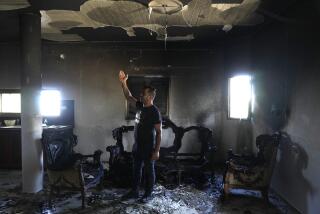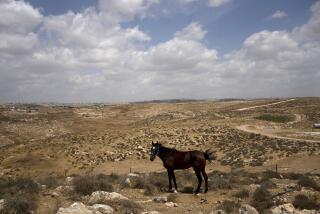Palestinian Protests Fall Shy of Hopes
- Share via
DEIR QADIS, West Bank — Here on a hillside covered with boulders and scrub grass, Palestinians rallied Thursday to protest against Jewish settlements and, more important, to send a message to Israeli Prime Minister-elect Ehud Barak.
But the “Day of Rage,” as the Palestinians called it, was in fact pretty low-key as days of rage go.
Organizers said they were disappointed by the low turnout at the demonstrations--in Deir Qadis and elsewhere in the West Bank and Gaza Strip--and, except for some minor clashes with Israeli forces, the general spirit was subdued.
Which is not to say that the Palestinians did not have a message to get across. They were initially delighted, or at least relieved, at Barak’s election May 17. But now, they are increasingly worried that the incoming Israeli premier will neglect their problems, especially the quickened pace of settlement expansion in the West Bank, as Barak focuses instead on peace with Syria and with the Israeli right wing.
A few hundred Palestinians, many bused in from nearby Ramallah, hoisted signs reading, “No peace with settlements,” and marched through this dusty, sunbaked village about 16 miles northwest of Jerusalem. They stopped on the outskirts of the town, on land they said Jewish settlers have begun clearing in an attempt to claim it as their own.
Across a narrow valley from the demonstrators stood a handful of Israeli troops. A few hundred yards to the right were towering cranes poised to build. Several hundred yards beyond the machinery were the six-story apartment buildings of the sprawling Jewish settlement of Kiryat Sefer.
Ibtisam Zuhdi, 32, said settlers with bulldozers and army protection last week burned brush, cut a dirt road and razed trees on her land. The harsh, unforgiving farmland has been in her family for generations, she said. When Barak won election, Zuhdi, her parents and seven brothers and sisters thought the conflict with the settlers would ease.
“We had hope things would change and we would get our land back and they would stop taking our olive trees,” Zuhdi said. “Now, the hope is gone. We live from the products of the olive trees. It is like death for us when they take our land.”
(A spokesman for the settlers could not be reached for comment, but often Israeli authorities deem land to be vacant and eligible for confiscation.)
After about an hour, as the face-off between the Deir Qadis villagers and the army was coming to an end, Palestinian youths began throwing stones at the troops, who fired tear gas in return. There were a couple of minor injuries.
Similarly, as many as 30 people were hurt in clashes near Nablus, Bethlehem, Hebron and in Gaza.
In Israel’s national election last month, Barak defeated right-wing Prime Minister Benjamin Netanyahu, whom the Palestinians regarded as an overly obstreperous partner in negotiating the land-for-security deals that form the basis of Israeli-Palestinian relations.
The Netanyahu government encouraged settlers to expand their outposts in the West Bank, which they consider biblical land that belongs to the Jews. Palestinians were relieved to be rid of Netanyahu but are now wondering how significantly Barak will change Israeli policy.
A couple of things have made the Palestinians particularly nervous. For one, Barak, who is trying to put together a coalition government, remained silent after an eleventh-hour expansion by Netanyahu’s regime of the Maale Adumim settlement to the city limits of Jerusalem.
Although he has hinted in the past that some settlements might have to be dismantled, Barak has also assured potential coalition partners that he will not cut off settlement funding immediately.
Palestinians are also dismayed to see Barak trying to draw Netanyahu’s Likud Party into his government.
At the same time, as the lack of enthusiasm in Thursday’s demonstrations indicated, the Palestinian leadership under Palestinian Authority President Yasser Arafat is also experiencing trouble. Unable to rally his followers, Arafat is seeing his own credibility and authority undermined.
Chagrined Palestinian officials sought to put the best spin on the low turnout.
“This is just the beginning,” said Marwan Barghouti, a leader of Arafat’s Fatah movement and a Palestinian lawmaker.
More to Read
Sign up for Essential California
The most important California stories and recommendations in your inbox every morning.
You may occasionally receive promotional content from the Los Angeles Times.














